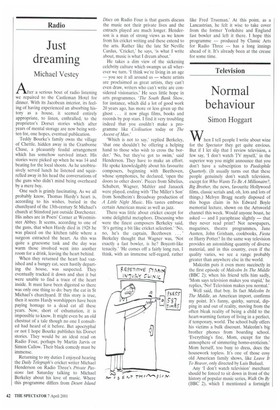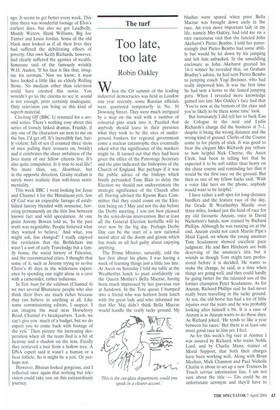Normal behaviour
Simon Hoggart
When I tell people I write about wine for the Spectator they get quite envious. But if I let slip that I review television, a few say, 'I don't watch TV myself,' in the superior way you might announce that you don't have a subscription to Paedophile Quarterly. (It usually turns out that these people genuinely don't watch television, except for Who Wants To Be A Millionaire?, Big Brother, the news, favourite Hollywood films, classic serials and, oh, lots and lots of things.) Melvyn Bragg neatly disposed of this bogus claim in his Edward Boyle memorial lecture, shown on the Artsworld channel this week. Would anyone boast, he asked — and I paraphrase slightly — that they never read print? Not newspapers, magazines, theatre programmes, Jane Austen, John Grisham, cookbooks, Fiesta or Harry Potter? In the same way television provides an astonishing quantity of diverse material, and in this country, even if the quality varies, we see a range probably greater than anywhere else in the world.
Malcolm puts it even more succinctly in the first episode of Malcolm In The Middle (BBC 2); when his friend tells him sadly, 'Mom says television makes you stupid,' he replies, 'No! Television makes you normal.'
Well said, that boy. In fact Malcolm In The Middle, an American import, confirms my point. It's funny, quirky, surreal, dipping in and out of reality, moving from the often bleak reality of being a child to the heart-warming fantasy of living in a perfect, if temporary, world. The school bully offers his victims a bulk discount. Malcolm's big brother phones from boarding school. 'Everything's fine, Mom, except for the atmosphere of simmering homo-eroticism.' Mom herself, too busy to dress, does the housework topless. It's one of those cosy old American family shows, like Leave It To Beaver, only directed by Luis Builuel.
Any 'I don't watch television' merchant should be forced to sit down in front of the history of popular music series, Walk On By (BBC 2), which I mentioned a fortnight ago. It seems to get better every week. This time there was wonderful footage of Elvis's earliest days, but also we got Leadbelly, Muddy Waters, Hank Williams, Big Joe Turner and Louis Jordan. Some of the old black men looked as if all their lives they had suffered the debilitating effects of poverty. Our own Keith Richards, however, had clearly suffered the agonies of wealth. Someone said of the famously wrinkly W.H. Auden, 'If his face is like that, imagine his scrotum.' Now we know; it must have looked a little like an elderly Rolling Stone. No medium other than television could have created this series. You wouldn't go to the cinema to see it; sound is not enough; print certainly inadequate. Only television can bring us this kind of superb material.
Clocking Off (BBC 1) returned for a second series. There's nothing cosy about this series of loosely linked dramas. Frankly, if any one of the characters sat next to me on the bus, I'd get off. It's incredibly fast, fairly violent, full of sex (I counted three shots of men pulling their trousers on, briskly) and it celebrates the sheer awfulness of the lives many of our fellow citizens live, It's also quite compulsive. Is it true to real life? No more than, say, Heartbeat, but in the opposite direction. Grainy realism is rarely more realistic than soft-focus sentimentality.
This week BBC 1 went looking for Jesus and Channel 4 for the Himalayan yeti. Son Of God was an enjoyable farrago of established history blended with nonsense, hovering permanently on the thin line between known fact and wild speculation. At one point Jeremy Bowen told us, 'In the past truth was negotiable. People believed what they wanted to believe.' And what, you might ask, has changed? I really enjoyed the revelation that the Bethlehem inn wasn't a sort of early Travelodge but a family home, the social history of Palestine, and the reconstructed cities. I thought that some of it, such as Jeremy trying to re-live Christ's 40 days in the wilderness experience by spending one night alone in a cave with a camcorder, rather ludicrous.
In Yeti: hunt for the wildman (Channel 4) we met several Bhutanese people who also think their lives are much richer because they can believe in anything at all. Like some commissioning editors, I suspect. I can imagine the meal near Horseferry Road, Channel 4's headquarters. 'Look, we can't give you much of a budget, but we do expect you to come back with footage of the yeti.' Then picture the increasing desperation when all the team find is a bit of hearsay and a shadow on the lens. Finally they retrieved a hair from a hollow tree. A DNA expert said it wasn't a human or a bear follicle. So it might be a yeti. Or perhaps not.
However, Bhutan looked gorgeous, and I reflected once again that nothing but television could take you on this extraordinary journey.



























































 Previous page
Previous page